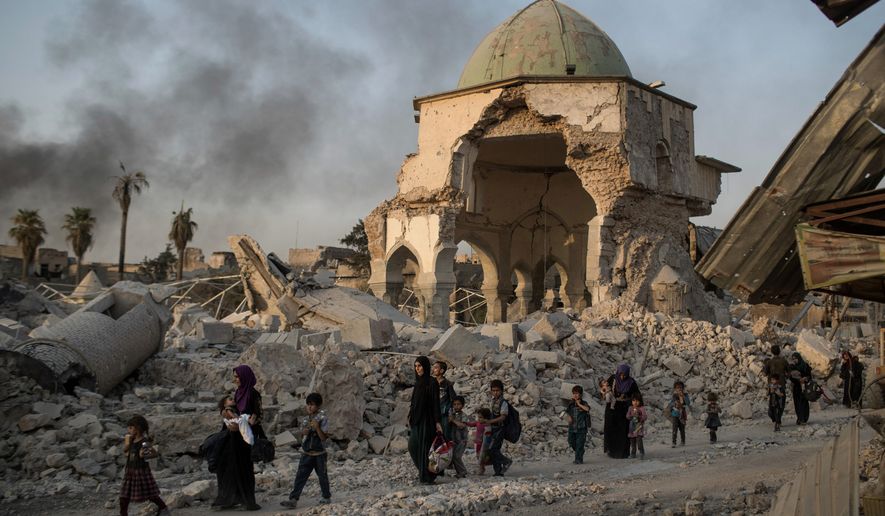The arrest of an obese Islamic State leader — his girth loaded by Iraqi forces onto a pickup truck — produced a number of confessions on how the captive unleashed a wave of terrorism in occupied Mosul from 2014 to 2017.
Shifa al-Nima, a Muslim “mufti” or religious scholar, also provided details on how radical Sunnis obtain cash to finance terrorism. In his case, as a networking young terrorist, he had a financial benefactor in Saudi Arabia and two terrorist funders who resided in London.
Iraqi security forces released photos of al-Nima on Jan. 16 sprawled on the floor of his Baghdad hiding place and of him being hoisted onto the flatbed.
President Trump has said U.S. troops smashed the Syria-Iraq “caliphate” of the late Abu Bakr al-Baghdadi, but U.S. troops continue to plan and support Iraq’s counter-ISIS missions.
“ISIS warriors are still spread across the region in some of the most unlikely locations,” said Robert L. Maginnis, a retired Army lieutenant colonel and national security author. “They are like rats that must be smoked out but wait patiently for the anticipated reemergence of a new caliph.”
Al-Nima confessed this month to issuing a string of rape-and-pillage “fatwas” that licensed ISIS fighters to kill and enslave. The jailed mufti provided a gruesome window into terrorist army’s hold on Iraq’s second-largest city from 2014 until July 2017.
The Supreme Judicial Council of Iraq published a detailed report on his interviews. The report was translated for the press by the Middle East Media Research Institute.
One of Iraq’s most-wanted, al-Nima had been on the run for months, hiding at his daughter’s house in the Muhandiseen neighborhood of Mosul. When Iraqi forces began scouring that residential area, he stayed on the move until his arrest in the Mansour district of Mosul.
“I issued fatwas permitting the expulsion of Christians from Mosul, enslavement, selling Yezidi women,” the 300-pound-plus al-Nima confessed.
He recounted his religious edicts for Mosul, one of the first Iraqi towns conquered by the Islamic State as it ruthlessly invaded from Syria in 2014.
He told his captors: “I issued the fatwas that punish the citizens who don’t go to mosques, a flogging fatwa for those who smoke cigarettes, and a fatwa requiring officials in the [Iraqi] security forces to obtain a repentant card and surrender their weapons. I also issued the fatwa requiring shop owners to pay [taxes] and the fatwa to expel Christians from Mosul, and I permitted killing of Shiites and issued other fatwas in regard to allowing ISIS fighters to enslave Yazidi women and sell them and killing the Yazidi men.
“I also issued fatwas to confiscate houses of displaced people and permitted ISIS fighters to blow up mosques in Mosul which had graves of prophets and righteous people inside them, such as permitting the destruction of Mosque of Prophet Yunus in August 2014,” al-Nima confessed.
He provided a biography, a sort of how-to book on becoming a violent religious-based extremist.
He graduated from Al-Madinah Al-Monawarah University in Saudi Arabia in 1984. From there, he became a teacher in the United Arab Emirates and then returned to Iraq.
Al-Nima joined extremist Sunni groups determined to oust Saddam Hussein. He issued fatwas permitting assassinations of Iraqi security forces in Mosul in 2006 and 2007.
His funding stream came from a mujahedeen residing in London and a Saudi national. He networked with Sunni terrorists, including a second Londoner.
“We discussed religious topics, and I explained to him the situation in Mosul and the details about the Iraqi forces and their affiliation with the Americans,” al-Nima said. “We talked about the role of jihadi factions, and he gave me $6,000 and asked that I spend it on armed groups. When I returned to Mosul, I met with members of armed groups and I distributed the money between them.”
He also traveled to Saudi Arabia that year, 2007, and met with a terrorist who introduced him to a sheikh, who provided $4,000.
Al-Nima founded a school for Islamic extremists. His pupils included a man who eventually became a bodyguard for ISIS founder al-Baghdadi. He died by suicide bomb during an October raid by the Army Delta Force in Syria.
Al-Nima pledged allegiance to ISIS and urged young men to join. Both of his sons were ISIS members. One faces a death sentence; the other is serving five years in an Iraqi prison.
Relying on Muslim law to order killings is the al Qaeda-ISIS playbook.
Mr. Maginnis said, “It’s not surprising that an ISIS-related Mufti issued fatwas that gave permission for Islamists to commit atrocities against the non-Sunni population of Iraq and Syria,” Mr. Maginnis said. “That was license for those Islamists to slash, burn, kill, rape and steal. These so-called warriors for the caliph were no better than criminal thugs hiding behind the air of legitimacy granted by their caliph al-Baghdadi and his legion of supportive muftis.”
In Operation Inherent Resolve, the U.S. is maintaining about 5,000 ground troops and air power in Iraq to prevent an ISIS resurgence.
An August assessment from the Defense Department inspector general stated that ISIS “solidified insurgent capabilities in Iraq” during the summer.
“ISIS carried out assassinations, suicide attacks, abductions, and arson of crops in both Iraq and Syria,” the inspector general said. “In addition, ISIS established ’resurgent cells’ in Syria and sought to expand its command and control nodes in Iraq.”
The report added, “ISIS remains capable of conducting ’asymmetric operations’ and exploiting tension between Iraq’s Shia and Sunni communities and popular discontent over the perceived failures of the Iraqi government.”
• Rowan Scarborough can be reached at rscarborough@washingtontimes.com.




Please read our comment policy before commenting.